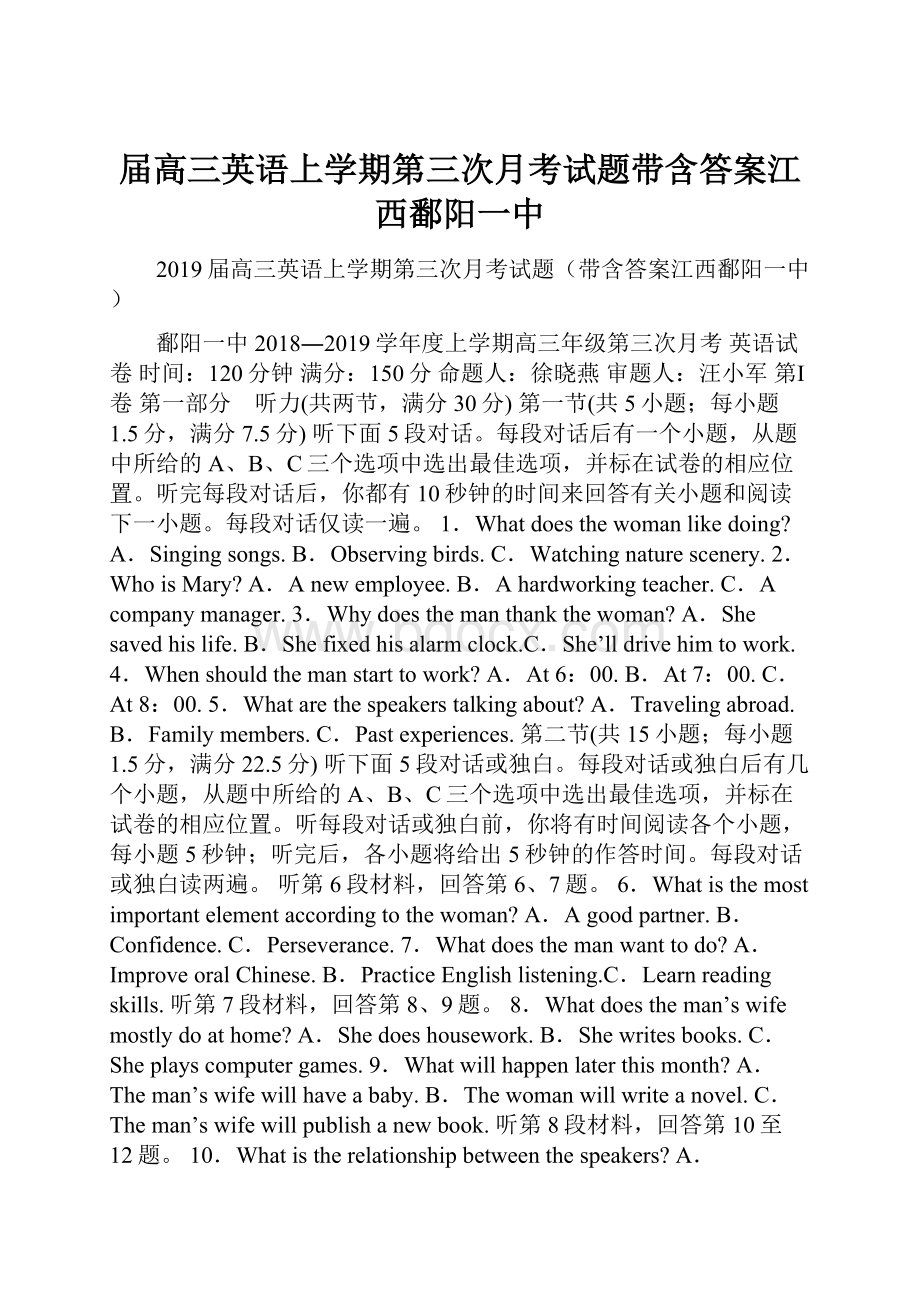届高三英语上学期第三次月考试题带含答案江西鄱阳一中文档格式.docx
《届高三英语上学期第三次月考试题带含答案江西鄱阳一中文档格式.docx》由会员分享,可在线阅读,更多相关《届高三英语上学期第三次月考试题带含答案江西鄱阳一中文档格式.docx(10页珍藏版)》请在冰豆网上搜索。

每小题1.5分,满分7.5分)听下面5段对话。
每段对话后有一个小题,从题中所给的A、B、C三个选项中选出最佳选项,并标在试卷的相应位置。
听完每段对话后,你都有10秒钟的时间来回答有关小题和阅读下一小题。
每段对话仅读一遍。
1.Whatdoesthewomanlikedoing?
A.Singingsongs.B.Observingbirds.C.Watchingnaturescenery.2.WhoisMary?
A.Anewemployee.B.Ahardworkingteacher.C.Acompanymanager.3.Whydoesthemanthankthewoman?
A.Shesavedhislife.B.Shefixedhisalarmclock.C.She’lldrivehimtowork.4.Whenshouldthemanstarttowork?
A.At6:
00.B.At7:
00.C.At8:
00.5.Whatarethespeakerstalkingabout?
A.Travelingabroad.B.Familymembers.C.Pastexperiences.第二节(共15小题;
每小题1.5分,满分22.5分)听下面5段对话或独白。
每段对话或独白后有几个小题,从题中所给的A、B、C三个选项中选出最佳选项,并标在试卷的相应位置。
听每段对话或独白前,你将有时间阅读各个小题,每小题5秒钟;
听完后,各小题将给出5秒钟的作答时间。
每段对话或独白读两遍。
听第6段材料,回答第6、7题。
6.Whatisthemostimportantelementaccordingtothewoman?
A.Agoodpartner.B.Confidence.C.Perseverance.7.Whatdoesthemanwanttodo?
A.ImproveoralChinese.B.PracticeEnglishlistening.C.Learnreadingskills.听第7段材料,回答第8、9题。
8.Whatdoestheman’swifemostlydoathome?
A.Shedoeshousework.B.Shewritesbooks.C.Sheplayscomputergames.9.Whatwillhappenlaterthismonth?
A.Theman’swifewillhaveababy.B.Thewomanwillwriteanovel.C.Theman’swifewillpublishanewbook.听第8段材料,回答第10至12题。
10.Whatistherelationshipbetweenthespeakers?
A.Coworkers.B.Acouple.C.Clientandmanager.11.Howdidthesalesdirectorfeelabouttheman’swork?
A.Satisfied.B.Disappointed.C.Surprised.12.Whatwillthemanprobablydotomorrowafternoon?
A.MeetFrank.B.Travelaroundthetown.C.Makeapresentation.听第9段材料,回答第13至16题。
13.Whatisthemandoing?
A.Changingabicycle.B.Returningabicycle.C.Orderingabicycle.14.Whatkindofbicycledoesthemanwant?
A.Ausedone.B.Asportsone.C.Atouringone.15.Howmuchshouldthemanpay?
A.249.5. B.220. C.185.16.Howwillthemanpay?
A.Bycheck.B.Incash.C.Bycreditcard.听第10段材料,回答第17至20题。
17.Howlongdoesthetourlast?
A.Twoweeks.B.Fivedays.C.Threedays.18.Wherewillthetouristsvisittomorrowafternoon?
A.ChinaFolkCultureVillage.B.WindowoftheWorld.C.DapengFort.19.WherewillthetouristsstayonFridaymorning?
A.InShenzhen.B.InHongKong.C.InGuangzhou.20.Howwillthetouriststravelhome?
A.Bycoach.B.Bytrain.C.Byplane.第二部分 阅读理解(共两节,满分40分)第一节(共15小题;
每小题2分,满分30分)阅读下列短文,从每题所给的四个选项(A、B、C和D)中,选出最佳选项。
AEuropehasallthebigdestinations:
London,Paris,Rome,Berlin.Visitorsfloodtherealltheyearround.Ifyouareunwillingtojointhem,youcantakeachanceandwalkthestreetsofsomecitiesthatarealittlebitsmaller,alittlebitlessfamous,butstillfullofEuropeangraceandcharm.HerearefourEuropeancitiestovisitthatyouprobablyhaven'
tbeentoyet.Besancon,FranceThishiddenFrenchcityhashadalongreputationforbeingawell-keptsecret.Itcanbeatoncesleepywithfewtouristsbutabundantgalleries,restaurants,andawonderfulBeauxArtsmuseumwhosecollectionissecondonlytoLouvre.ThecityiswoundbytheRiverDoubsandalsotouts(吹捧)itsownUNESCOWorldHeritageSiteintheCitadel,hometoseveralsmallmuseumsandazoo.Seville,SpainForthetouristwhoisalreadytiredofBarcelonaandMadrid,Sevilleoffersadifferenttake(意见)onSpain.LocatedontheSoutherncoast,itkeepsbeautifulsignsofthelongperiodofMoorishrule,nowheremorethanintheAlcá
zarpalacebuilding,justoneofthecity'
sUNESCOWorldHeritageSites.Sevillehasoveradozenmuseums,tropicalparkland,andprobablythebesttapas(餐前小吃)cultureinallofSpain.Ghent,BelgiumGhentisacitythatlookslikeitshouldbethesettingforafairytale.AllofthetypicalBelgiumfeaturesaboundhere-wafflesandbeer.EveryyearfromSaturdaybeforeJuly21,Ghenthostsaten-dayfestival.Thismusicandtheaterfestivaldrawsalmost2millionvisitors,asthecitystreetstransformintoperformancespacesforperformers,buskers(街头艺人)andmusicians.Palermo,ItalyPalermoisthecapitalcityofSicily,thesouthernislandoffthecoastofmainlandItaly.Thecityhasanancienthistory,andthevariousculturesthathaveacontrolledtheislandthroughtheyearshavealllefttheirmarksonit.Youcanseewindingstreetmarkets,antique(古玩)fairsandopenairnightclubhere.21.Wherecanvisitorsenjoyacolorfulnightlife?
A.Besancon.B.Barcelona.C.Ghent.D.Palermo.22.WhatcanvisitorsdoinSeville,Spain?
A.Visitantiquefairsandclubs.B.Playwithanimals.C.Exploreover20museums.D.HuntforMoorishinfluences.23.Whichcountryoffersvisitorsacitywithrichgalleries?
A.France.B.Spain.C.Belgium.D.Italy.24.WhatdothefourEuropeancitieshaveincommon?
A.Theyareallcapitalcities.B.Theyarelessknownbutattractive.C.Theyhostvariousshows.D.They’reallUNESCOWorldHeritageSites.BIgooutofmywaytosay“thankyou”tomypartnerfrequently,andhe’sthesameway.Wewerebothraisedbyparentswhovaluedpoliteness,andmorethanthat,Iwanttodoallthoselittlethingsthatpsychologistssayhelpcouplesstaytogether.Expressinggratitudeisoneofthosethings,soaquick“thank”seemslikeaneasyone.Butaccordingtoarecentstudy,we’renotatalltypical.Thestudylookedatover1,000recordingsofcasualconversationsamongfamiliesandclosefriends.Inonlyaboutoneoutof20timeswereexpressionsofthanksobserved.Phrasesthatmeant“thanks”butweren’tadirecttranslationofthewordwerecounted,includingphysicalgesturesofthanks.Theresearcherslookedatawildvarietyofpeoplefromdifferentplaces,representingeightlanguages:
Polish,Russian,Italy,English,Murrinh-patha(anAboriginallanguage),Cha’palaa,LaoandSiwu.TheBritsthankedpeopleclosetothemthemost,about14.5percentofthetimeandclosebehindthemweretheItaliansat13.5percent.TheMurrinh-pathacamenextat4.5percentandfollowingthemweretheRussians,thePolish,theLaotiansandtheSiwuspeakers.Thelowest?
Well,theCha’palaaspeakersofEcuadordon'
thaveawordfor“thankyou”atall.Asthelinguistsexplained,“Expressingthanks,insomecultures,ismoreofalinguistictraditionthanatrueexpressionoffeelings.Incultureswherethanksarelessoftensaid,it’sbecausesocialcooperationistakenforgranted,and“thankyou”isn'
treallyneededornecessary.”Theideathatyoudon'
tneedtothankothersbecauseit’sassumedthatyou’reappreciativeisbeautiful.Butitisabithardformetoaccept.SoI’llkeepsaying“thanks”asfrequentlyasIdo.Butasafrequenttraveler,I’llkeepinmindtowatchthelocalcustomandfollowsuit.25.Whatmightbepsychologists’opinionaboutexpressionthanks?
A.Itcanshowaperson'
svalues.B.Itispasseddownfromparents.C.Itisalittleandunnecessarything.D.Itcancontributetocloserelationship.26.Whatistypicalamongfamilymembersaccordingtothestudy?
A.Theysaythanksatanytime.B.Theyseldomexpressthanks.C.Theyoftenshowthanksusinggestures.D.Theyoftenuseindirecttranslationofthanks.27.Whoneversay“thankyou”?
A.TheCha’palaa.B.ThePolish.C.TheItalians.D.TheRussians.28.Whatismainlytalkedaboutinthetext?
A.Peoplethankclosefriendsandfamilyless.B.Familymembersdon'
tneedtothankeachother.C.Closefriendshavedifferentwaystoexpressthanks.D.Differentcultureshavedifferentwaystoexpressthanks.CAccordingtoastudypublishedrecentlyintheJournalScience,scientistshavefoundawaytohacktheplant'
sgenestohelpmakeitusesunlightmorequickly,whichcouldincreasetheamountoffoodproducedaroundtheworldoneday.Plantsusesunlight,waterandcarbondioxidetomaketheirownfood.Scientistsfindplantsuselessthan1%oftheenergyavailabletothem.Butbyhackingaplant’sgenes,scientistsareabletoincreasetheamountofleafgrowthonplantsbetween14%and20%.Specifically,scientistshackedtheplant'
sprotectivesystem.Normally,thissystemisactivated(激活)whenaplantgetstoomuchsunlight,saidscientistKrishnaNiyogi.Whentheplantsensesthelight,itgetsridofextraenergyandcreatesmoreleaves.Whentheplantisinshade,theprotectivesystemisturnedoff.StephenLongistheleadauthorofthestudy.Hecomparedaplant’sprotectivesystemtolight-adjustingglasses.Whenweweartheglassesoutsideduringtheday,lenses(镜头)darkenorlightendependingonhowsunnyitis.Plantsdothesamething.Butinplantstheadjustmentcantakeanywherefrom10minutestoanhour.Thismakesithardforplantstogettherightamountofsunlightneededtocreatefood.Thenewstudyspeedsuptheprocess.Bychangingtheplant'
sgenes,theprotectivesystemturnedonandoffmorequicklythannormal.Asaresult,leafgrowthintwoplantsincreasedby20%,whileleafgrowthonathirdplantincreasedby14%."
Nowthatweknowitworks,itwon'
tbetoodifficulttodoitwithothercrops,"
saidTang."
Ifyoulookatcropsaroundtheworld,"
hesaid,"
itwouldincreaseyieldmanymilliontonsoffood."
Itwillbeatleast15yearsbeforescientistscanadjustcropsonalargescale,Longsays.Buthebelievesthestudyisabreakthrough.29.TheclosestmeaningoftheunderlinedwordinParagraph2is______.A.designingB.changingC.coveringD.feeding30.Whatwillhappentoaplantwhenexposedtotoomuchsunlight?
A.Slowingdownitsleavesgrowth.B.Foldingupitsleaves.C.Turningonitsprotectivesystem.D.Stoppingtakinginenergy.31.Howdoesplant'
sprotectivesystemworkaccordingtoLong?
A.Bytimingtheexposuretodaylight.B.Byadjustingsunlightplantsreceive.C.Bybeingpositionedunderpropershades.D.Byswitchingbetweenstrongandweaklights.32.Whats